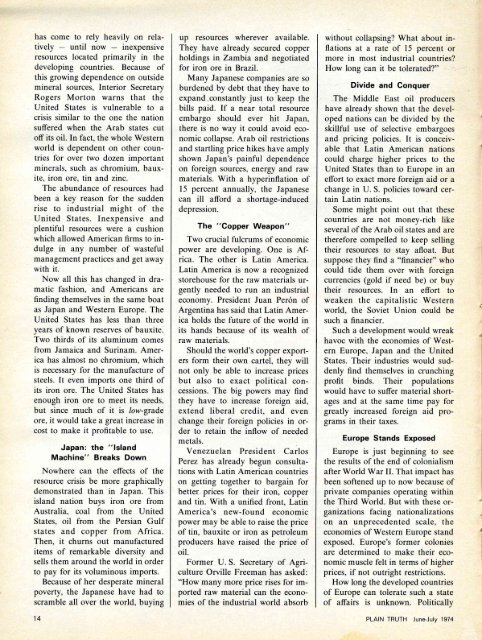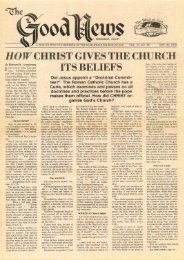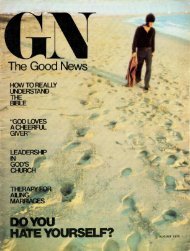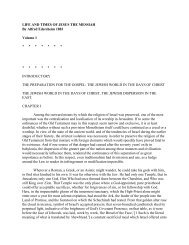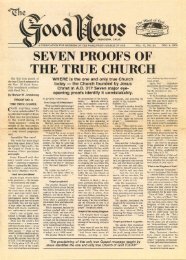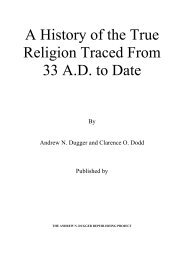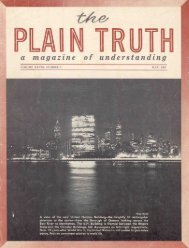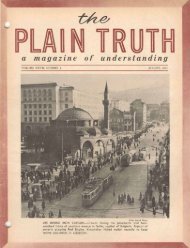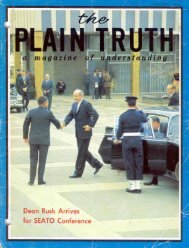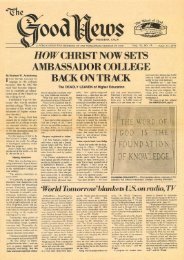You also want an ePaper? Increase the reach of your titles
YUMPU automatically turns print PDFs into web optimized ePapers that Google loves.
has <strong>com</strong>e to rely heavily on relatively<br />
- until now - inexpensive<br />
resources located primarily in the<br />
developing countries. Because of<br />
this growing dependence on outside<br />
mineral sources, Interior Secretary<br />
Rogers Morton warns that the<br />
United States is vulnerable to a<br />
crisis similar to the one the nation<br />
suffered when the Arab states cut<br />
off its oil. In fact, the whole Western<br />
world is dependent on other countries<br />
for over two dozen important<br />
minerals, such as chromium, bauxite,<br />
iron ore, tin and zinc.<br />
The abundance of resources had<br />
been a key reason for the sudden<br />
rise to industrial might of the<br />
United States. Inexpensive and<br />
plentiful resources were a cushion<br />
which allowed American firms to indulge<br />
in any number of wasteful<br />
management practices and get away<br />
with it.<br />
Now all this has changed in dramatic<br />
fashion, and Americans are<br />
finding themselves in the same boat<br />
as Japan and Western Europe. The<br />
United States has less than three<br />
years of known reserves of bauxite.<br />
Two thirds of its aluminum <strong>com</strong>es<br />
from Jamaica and Surinam. America<br />
has almost no chromium, which<br />
is necessary for the manufacture of<br />
steels. It even imports one third of<br />
its iron ore. The United States has<br />
enough iron ore to meet its needs,<br />
but since much of it is low-grade<br />
ore, it would take a great increase in<br />
cost to make it profitable to use.<br />
Japan: the "Island<br />
Machine" Breaks Down<br />
Nowhere can the effects of the<br />
resource crisis be more graphically<br />
demonstrated than in Japan. This<br />
island nation buys iron ore from<br />
Australia, coal from the United<br />
States, oil from the Persian Gulf<br />
states and copper from Africa.<br />
Then, it churns out manufactured<br />
items of remarkable diversity and<br />
sells them around the world in order<br />
to pay for its voluminous imports.<br />
Because of her desperate mineral<br />
poverty, the Japanese have had to<br />
scramble all over the world, buying<br />
14<br />
up resources wherever available.<br />
They have already secured copper<br />
holdings in Zambia and negotiated<br />
for iron ore in Brazil.<br />
Many Japanese <strong>com</strong>panies are so<br />
burdened by debt that they have to<br />
expand ,constantly just to keep the<br />
bills paid. If a near total resource<br />
embargo should ever hit Japan,<br />
there is no way it could avoid economic<br />
collapse. Arab oil restrictions<br />
and startling price hikes have amply<br />
shown Japan's painful dependence<br />
on foreign sources, energy and raw<br />
materials. With a hyperinflation of<br />
15 percent annually, the Japanese<br />
can ill afford a shortage-induced<br />
depression.<br />
The "Copper Weapon"<br />
Two crucial fulcrums of economic<br />
power are developing. One is Africa.<br />
The other is Latin America.<br />
Latin America is now a recognized<br />
storehouse for the raw materials urgently<br />
needed to run an industrial<br />
economy. President Juan Peron of<br />
Argentina has said that Latin America<br />
holds the future of the world in<br />
its hands because of its wealth of<br />
raw materials.<br />
Should the world's copper exporters<br />
form their own cartel, they will<br />
not only be able to increase prices<br />
but also to exact political concessions.<br />
The big powers may find<br />
they have to increase foreign aid,<br />
extend liberal credit, and even<br />
change their foreign policies in order<br />
to retain the inflow of needed<br />
metals.<br />
Venezuelan President Carlos<br />
Perez has already begun consultations<br />
with Latin American countries<br />
on getting together to bargain for<br />
better prices for their iron, copper<br />
and tin. With a unified front, Latin<br />
America's new-found economic<br />
power may be able to raise the price<br />
of tin, bauxite or iron as petroleum<br />
producers have raised the price of<br />
oil.<br />
Former U. S. Secretary of Agriculture<br />
Orville Freeman has asked:<br />
"How many more price rises for imported<br />
raw material can the economies<br />
of the industrial world absorb<br />
without collapsing? What about inflations<br />
at a rate of 15 percent or<br />
more in most industrial countries?<br />
How long can it be tolerated?"<br />
Divide and Conquer<br />
The- Middle East oil producers<br />
have already shown that the developed<br />
nations can be divided by the<br />
skillful use of selective embargoes<br />
and pricing policies. It is conceivable<br />
that Latin American nations<br />
could charge higher prices to the<br />
United States than to Europe in an<br />
effort to exact more foreign aid or a<br />
change in U. S. policies toward certain<br />
Latin nations.<br />
Some might point out that these<br />
countries are not money-rich like<br />
several of the Arab oil states and are<br />
therefore <strong>com</strong>pelled to keep selling<br />
their resources to stay afloat. But<br />
suppose they find a "financier" who<br />
could tide them over with foreign<br />
currencies (gold if need be) or buy<br />
their resources. In an effort to<br />
weaken the capitalistic Western<br />
world, the Soviet Union could be<br />
such a financier.<br />
Such a development would wreak<br />
havoc with the economies of Western<br />
Europe, Japan and the United<br />
States. Their industries would suddenly<br />
find themselves in crunching<br />
profit binds. Their populations<br />
would have to suffer material shortages<br />
and at the same time pay for<br />
greatly increased foreign aid programs<br />
in their taxes.<br />
Europe Stands Exposed<br />
Europe is just beginning to see<br />
the results of the end of colonialism<br />
after World War II. That impact has<br />
been softened up to now because of<br />
private <strong>com</strong>panies operating within<br />
the Third World. But with these organizations<br />
facing nationalizations<br />
on an unprecedented scale, the<br />
economies of Western Europe stand<br />
exposed. Europe's former colonies<br />
are determined to make their economic<br />
muscle felt in terms of higher<br />
prices, if not outright restrictions.<br />
How long the developed countries<br />
of Europe can tolerate such a state<br />
of affairs is unknown. Politically<br />
PLAIN TRUTH June-July 1974


